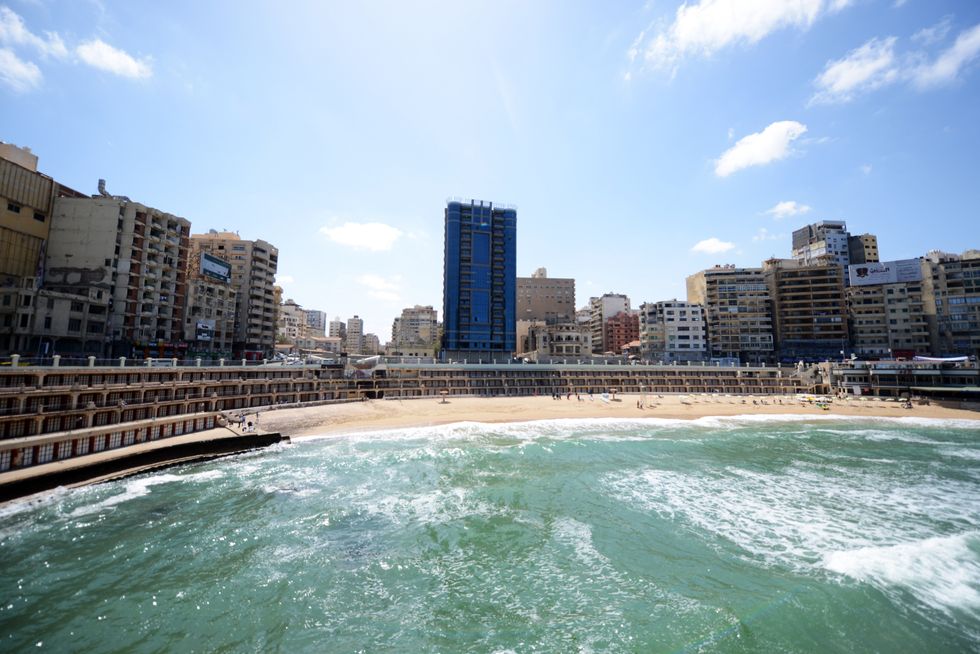Gregory Robinson
Apr 01, 2025
Archaeology breakthrough as Cleopatra's 'true face' discovered in long-lost tomb
GB News Videos / VideoElephant
The historic and vibrant Egyptian city of Alexandria, known as the birthplace of Cleopatra, is sinking.
Located along the Mediterranean Sea and northwest of Cairo, it’s Egypt’s second largest city and its main seaport. Its impressive history dates back to when it was founded in 331 BC by Alexander the Great and from then on it became a major cultural and intellectual centre.
It’s now the location of famous monuments and ancient ruins, including the Catacombs of kom el Shoqafa and the Anfushi Tombs and as of 2023, the city has a population of 6.1 million people.
However, in the last 10 years, the rate at which buildings along the ancient city’s seafront has gone up from around one per year to as many as 40, according to a study published in the journal Earth’s Future, and this has raised significant concern.
Over the past two decades, 280 buildings have collapsed and more than 7,000 are at risk of crumbling in the future, according to the research paper. Between 2014 and 2020 alone 86 buildings fell and 201 partially collapsed across the city, causing 85 deaths.
What is causing the buildings to fall in Alexandria, Egypt?
Scientists researching the startling situation have found that the Egyptian city is sinking due to rising sea levels and coastal erosion.
“The true cost of this loss extends far beyond bricks and mortar," said study co-author Essam Heggy, a water scientist from Viterbi School of Engineering at the University of Southern California. "We are witnessing the gradual disappearance of historic coastal cities, with Alexandria sounding the alarm. What once seemed like distant climate risks are now a present reality."
Alexandria’s buildings are crumbling as a result of rising levels of seater into the ground under the city, and as saltwater encroaches further inland, it raises groundwater levels beneath buildings and infrastructure. This can cause the ground to sink, leading to structures destabilising and the increased chance of collapse.
When the saltwater corrodes the steel reinforcement of the foundations of buildings, it causes further strain to the strength and integrity of buildings.

"Our study challenges the common misconception that we'll only need to worry when sea levels rise by a metre" Heggy said. "However, what we're showing here is that coastlines globally, especially Mediterranean coastlines similar to California's, are already changing and causing building collapses at an unprecedented rate."
The researchers mapped buildings that collapsed in the city between 2001 and 2021, and compared satellite images from between 1974 and 2021, with city maps from 1887, 1959, and 2001 to determine the rising sea level.
Alexandria has seen its coastline move inland by tens of metres over the past few decades according to the data collected, with some regions experiencing up to 79 to 118 feet (24 to 36m) of soil erosion per year. Rising sea levels are primarily caused by climate change, specifically melting glaciers and ice sheets which adds water to Earth’s oceans. Warmer ocean water also expands, a process called thermal expansion, which further contributes to sea level rise.
A number of tips for how the city could prepare for more seawater in the future was given by the researchers, including building sand dunes and other barriers along the coast. Buildings could also be elevated and those who live in high-risk areas might have to be relocated.
"Historic cities like Alexandria, which represent the cradle of cultural exchange, innovation and history, are crucial for safeguarding our shared human heritage," Heggy said. "As climate change accelerates sea level rise and coastal erosion, protecting them isn't just about saving buildings; it's about preserving who we are."
Why not read...
Archaeologists discover 'miracle' in ancient Egyptian tomb
Archaeologists make 'significant' discovery in Egypt that may reveal Cleopatra's true face
Sign up for our free Indy100 weekly newsletter
How to jointhe Indy100's free WhatsApp channel
This article was originally published on 7 March
Have your say in our news democracy. Click the upvote icon at the top of the page to help raise this article through the Indy100 rankings
Top 100
The Conversation (0)














